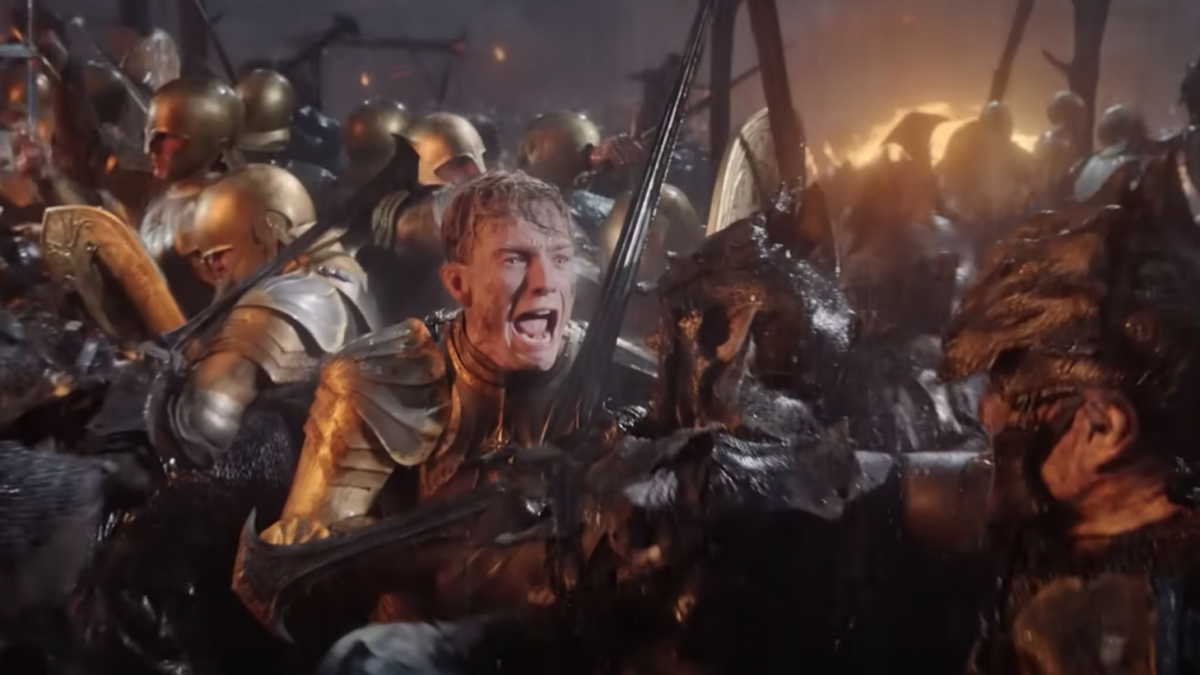“I’ve seen a lot of reactions that have immediately suggested, ‘Oh, this is really sloppy,’” said Corey Olsen, a medieval studies scholar who goes by the moniker “Tolkien Professor” online, in a live Q&A interview. “[And] I’m feeling a little challenged in trying to orient myself.”
He’s not alone in his reaction to “The Rings of Power,” Amazon’s $700 million dollar prequel TV series to J.R.R. Tolkien’s “The Lord of the Rings,” which premiered with two episodes this past weekend. To see Middle Earth reduced to the TV format is jarring. So is the depiction of “Commander Galadriel” and the show’s portrayal of Valinor, the elves’ undying lands.
Advance coverage, such as in TIME Magazine, leans into Hollywood hype rather than interrogation from serious Tolkien scholars. It’s famously the most expensive TV season ever produced, with season two soon heading into production. The show is a visual feast of sweeping landscapes, golden vistas, and elaborate artisanship at many levels. But are elaborate visuals enough to make the series a faithful portrayal of Tolkien’s work?
Olsen, a medieval studies Ph.D. who has taught university-level and free classes on the Tolkien legendarium for over a decade, admits being “confused” by the serialized drama so far. He adds: “But there is so much more information that is going to be coming about these things, I am content to be patient.”
His approach accords with where several longtime Tolkien adherents have landed on this glossy version of Middle Earth. Considering the series has been outlined as 40 episodes over five seasons, some are willing to wait until this eight-episode season one finishes to better evaluate themes and intent.
Steven Greydanus, a Catholic deacon and father of seven — and the rare Christian writer who is also a member of the New York Film Critics Circle — notes the premiere episodes are a “mixed bag” but urges Tolkien fans to “keep an open mind.” Similarly, Aaron Earls, who works at LifeWay Research in Nashville and blogs at The Wardrobe Door, admits having “quibbles” with some creative choices. ”But the desire and effort to prove faithful to Tolkien is clear,” he stated.
But with inevitable changes to the source material and numerous hands involved, can any good come of it?
The Oliphaunt in the Room
Most reviews of “The Rings of Power” touch on — to use a term from Middle Earth — the oliphaunt in the room: how Galadriel has been depicted as a field commander of elves and, by all appearances, on a vengeful mission motivated by the death of her brother.
Several reviewers note this portrayal as not befitting Tolkien. “Nothing against Galadriel handily dispatching a vicious snow troll … but the badass approach to writing Strong Female Characters is long since a tiresome cliché,” writes Greydanus. “It seems like a terrible storytelling decision.”
English professor Ben Reinhard, who recently published a new translation of Tolkien’s beloved “Beowulf,” gives a much starker assessment. His scathing review calls Galadriel in the premiere episodes “one of the least likable protagonists ever committed to screen … an arrogant Amazon (with) a smothering self-righteousness, hell-bent on revenge.”
Yet several commentators view this Galadriel as though she is at the start of a long character arc, with Kevin McLenithan of Christ and Pop Culture noting “the gulf between” this depiction of her and the one seen over 3,000 years later in the film trilogy. “How might [this] obsessive, loose-cannon warrior have grown into [Cate] Blanchett’s gliding, One Ring-rejecting queen?” he asks.
But the show introduces other jarring changes from the source material, as well. Tolkien’s legendarium describes key Second Age events — the rise of Sauron, the forging of the rings of power, and the rise and fall of the seafaring kingdom Númenor — as occurring over thousands of years.
That might work for TV if all the characters are elves who live for millennia. To have humans, dwarves, and Harfoots (ancestors of Hobbits) as part of the ensemble, writers compressed the timeline. “We brought some events up and [moved] some back,” said co-showrunner J.D. Payne in a recent interview. “We worked very closely with the Tolkien estate to make sure we had their blessing to do that, as one of the big liberties that we took in adapting this.”
A third oft-heard criticism concerns how king Gil-galad appears to grant certain elves passage to Valinor — an analog of sorts for eternity — as if it were a military honor. “I was most taken aback by this,” said scholar Olsen. “Gil-galad is in charge in this show. [But] I don’t think he has the power to ‘open the curtain’ to Valinor. Instead, it seems like he’s the one who owns the boats.”
Such minutiae of the mythology will send many reaching for copies of Tolkien’s novels; in fact, HarperCollins predicts “Rings” and related works will hit new sales records in the coming weeks.
Can Truth Prevail Amid Powerful Corruption?
As potential evidence that “The Rings of Power” will inevitably abandon any hint of virtue or its roots in Tolkien, critics have noted the show hiring writer-producer Bryan Cogman who worked on HBO’s prurient “Games of Thrones” TV franchise.
However, in interviews, Cogman has emphasized how “life-affirming” and “life-giving” he has found Middle Earth as opposed to the hyper-violent, obscene world of Westeros. “There’s a different tone, a different vibe, a different feeling to the world of Tolkien, and it was one J.D. (Payne) and Patrick (McKay) were adamant we embrace,” said Cogman.
For his part, co-showrunner Payne says that “timeless themes” of the series include how “staying true and loyal to your companions in a fellowship can overcome even the armies of evil” and exposing “the corrupting influence of power.”
One hopes Amazon’s executives will consider all aspects of these themes.
A cutthroat player in several highly competitive industries, Amazon often seems more Orc-like than Ent-ish in its practices. It’s perhaps why some Tolkien fans feel a certain dissonance about this series, promoted as another work of commerce to add to an online cart.
The showrunners, self-professed Tolkien nerds, seem genuine in describing why they love Middle Earth. “It takes you there — it takes you to places where people die. People go evil. There’s true tragedy in Tolkien in the greatest sense of the word,” said Payne.
“But at the same time, there’s always that one ray of light,” he added. “Even passing through great pain, there is still hope for something good at the end.” From the season one finale to wherever season five ends up years from now, it remains to be seen if “The Rings of Power” can deliver on those lofty aspirations.
Drawing on the moral symbolism of Tolkien’s magical rings of power, reviewer McLenithan raises a central question about this loose fantasy adaptation. “Will it function like an Elven Ring, enhancing, embellishing, and nourishing an already good creation? Or will it meet with the fate of the Dwarven Rings, which killed contentment and fueled a never-ending appetite for more riches before being lost forever to dragons?”









